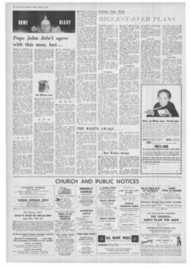Page 6, 14th January 1966
Page 6

Report an error
Noticed an error on this page?If you've noticed an error in this article please click here to report it.
Tags
Share
Related articles
The Mass And The Liturgy More Problems
Dynamite In A Plain Envelope
Changing The Church To Make
Churches For The Poor, The Snobs, And Liberals Too
On Understanding The Mystery Of Christ
DO CHANGES MAKE CHURCH-GOING MORE INTERESTING?
Three books reviewed by THOMAS CORBISHLEY, S.J.
WHEN the history of the Church in the first half of the 20th century comes to be seen in its true perspective. it may well be that the liturgical movement will be seen as the most important force.
Perhaps, at present, too many people see the liturgical changes in the Church either as rather tiresome interruptions of a familiar pattern of devotion or, more enthusiastically. as making attendance at church rather more interesting.
Three new books, in their different ways, show that something quite fundamental is involved, Fr. Louis Bouyer's The Liturgy Revived ( Darton, Longman & Todd, 5s. 6d.), is no more than a kind of running commentary on the Constitution on the Liturgy produced by the Second Vatican Council.
He brings out the profound doctrinal basis of the whole Constitution. while showing how effective, for the renewal of the life of Christians as a whole, a genuine appreciation of the new liturgy can be.
A short quotation may serve to encourage those who find recent changes rather trying, while it will restrain the exaggerated enthusiasm of those who think that change is all that matters: "If people do not pray in the liturgy because an unceasing turmoil prevents them from doing it, then the liturgy. however noisy and agitated, has become interiorly dead."
Liturgy in Development is a most valuable collection of papers produced by the Dutch Documentation Centre, edited by Alting von Geusau; and well translated by H. J. J. Vaughan (Sheed & Ward, 12s. 6d.). In a series of studies, the whole background to the Conciliar Constitution is explored. The first paper. entitled "Word and Sacrament". shows how the separation of the faithful at large from the liturgical action of the Church grew up, and briefly indicates the origins of the new movement for liturgical renewal, based on a revaluation of the nature of the sacrament and the rediscovery of the Biblical and patristic concepts in this field.
Modern thinking has moved away from the almost mechanical idea of the Sacraments as producing their effects ex opere operate to the notion of Christ as the "Arch-Sacrament, the One who has entered into our reality and in whom we meet God".
Two other papers give a brief account of the development of the new liturgical spirit, while a fourth paper relates this development to the work of the Council. Another brief but most valu able chapter discusses the meaning of the term "The Priesthood of the Faithful".
Turning to The Renewal of Worship, we find that the spirit which is at work in the Catholic Church is also active both in Anglicanism and Dissent (Oxford University Press, 9s. 6d.). Although not explicitly concerned with Ecumenism, this is a most useful contribution to the promotion of Christian Unity. edited by Ronald C. D. Jasper. All who are in any way concerned about Christian Unity—and that should mean all Christians—will find in it encouragement and inspiration.
A short quotation from the Dean of St. Paul's should be pondered by all: "There is much to be said on the need for agreement in belief before we can join in worship . .. But there is also much to be said in favour of starting with worship . . . The truth is, of course, that doctrine and worship go together and when separated languish. Doctrine without worship is only an exercise in metaphysics, while worship without doctrine declines into `uplift'."
blog comments powered by Disqus











